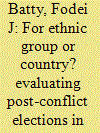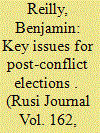| Srl | Item |
| 1 |
ID:
144461


|
|
|
|
|
| Summary/Abstract |
The utility of post-conflict elections in sub-Saharan Africa has been the subject of lively academic and policy debates. While some scholars associate several electoral outcomes with votes for peace, others argue that post-conflict elections exacerbate existing cleavages and could reproduce the conditions that led to civil war if the right electoral system is not employed. This paper examines these contesting claims using electoral data in a comparative study of the first truly post-conflict elections in Sierra Leone and Liberia. The analysis shows that political leaders in both countries received votes across numerous cleavage lines in contradiction with an ethnic census.
|
|
|
|
|
|
|
|
|
|
|
|
|
|
|
|
| 2 |
ID:
156990


|
|
|
|
|
| Summary/Abstract |
Elections are central to many contemporary post-conflict accords, but poorly timed elections may have negative consequences for the consolidation of both peace and democracy. Benjamin Reilly examines key issues of: electoral timing, including how soon to hold elections following hostilities; whether to sequence national and local polls; and which models of electoral system and administration are most appropriate in post-conflict environments.
|
|
|
|
|
|
|
|
|
|
|
|
|
|
|
|
| 3 |
ID:
073992


|
|
|
|
|
| Publication |
2006.
|
| Summary/Abstract |
The 2003 Comprehensive Peace Agreement (CPA) and the ensuing two-year-long National Transitional Government of Liberia (NTGL), which brought together two rebel forces, the former government and members of civil society, justifiably had many critics but also one positive and possibly redeeming feature. In spite of, or perhaps because of, the realpolitik nature of the CPA and the barely disguised gross corruption of the members of the coalition government, the protagonists in the second Liberian civil war (2000-03) complied with the agreement and the peace process held. The culmination of this sequence of events was the 11 October 2005 national elections, the 8 November presidential run-off and the 16 January 2006 inauguration. In several ways, this was the African post-conflict election that broke the mould, but not just in that a woman, Ellen Johnson-Sirleaf, won the presidential race, and a football star, George Weah, came second. The virtual absence of transformed rebel forces or an overbearing incumbent in the electoral races, partially as a result of the CPA and NTGL, gave these polls extraordinary features in an African setting.
|
|
|
|
|
|
|
|
|
|
|
|
|
|
|
|